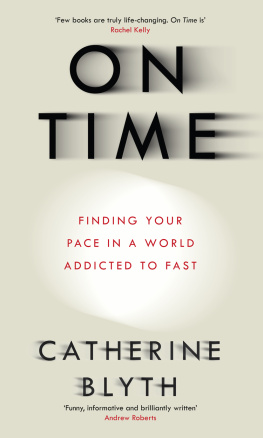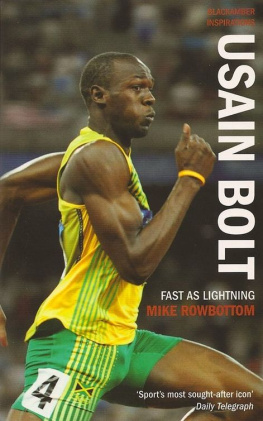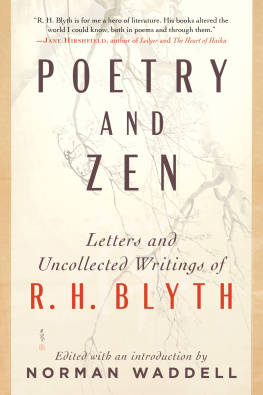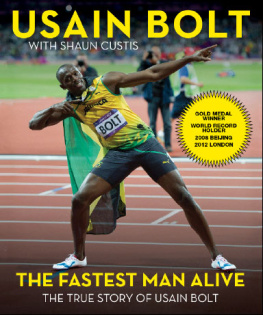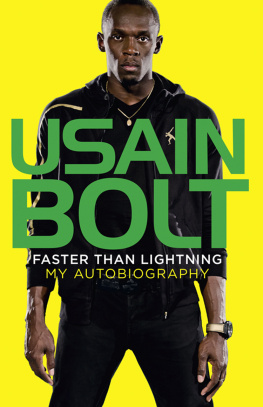William Collins
An imprint of HarperCollinsPublishers
1 London Bridge Street
London SE1 9GF
www.WilliamCollinsBooks.com
This eBook first published in Great Britain by William Collins in 2017
Copyright Catherine Blyth 2017
Catherine Blyth asserts the moral right to be identified as the author of this work in accordance with the Copyright, Designs and Patents Act 1988
Primavera by Robin Robertson, from Swithering Robin Robertson 2006, reproduced with permission of Pan Macmillan via PLSclear; This Is the First Thing from The Complete Poems by Philip Larkin, reproduced with permission of Faber and Faber Ltd.
A catalogue record for this book is available from the British Library
All rights reserved under International and Pan-American Copyright Conventions. By payment of the required fees, you have been granted the non-exclusive, non-transferable right to access and read the text of this e-book on-screen. No part of this text may be reproduced, transmitted, down-loaded, decompiled, reverse engineered, or stored in or introduced into any information storage and retrieval system, in any form or by any means, whether electronic or mechanical, now known or hereinafter invented, without the express written permission of HarperCollins.
Source ISBN: 9780008189983
Ebook Edition June 2017 ISBN: 9780008189990
Version: 2017-04-11
For Saskia and Rafael
I would have written a shorter letter,
but I didnt have the time.
Blaise Pascal, 4 December 1656
Contents
There is enough time
Hurry up.
Is this your catchphrase? It used to be mine. I lived like a criminal, always on the run, but perpetually running late. For the life I never got around to living, there was never enough time. Each day I climbed onto an accelerating treadmill, and each evening my to-do list grew longer, just like Pinocchios nose. It was as if all my good intentions were lies whose only productive property was to create more of themselves.
Until I realised that there is enough time if you stop trying to outrace the clock. This book explains how such a change is possible, even for a hurry slave like me. It is for anyone who longs to understand time better: what it is, where it goes and how to get it back.
Time is a dangerous subject to tackle. Once you begin exploring this thing that permeates everything, where to stop? But I had to take it on; I was too time-boggled not to. It was also increasingly clear to me that my problem, as personal and painful as it felt, was not mine alone.
Rising numbers of us rattle through our weeks, feeling like the inadequate servants of an insatiable mob of commitments. On the rare occasions that we leave work on time, we slink out, guilty as adulterers. Many friends, outwardly successful, appear trapped in a busy loneliness. Life passes in a blur of images glimpsed from their runaway train.
At first I imagined this was a generational issue. Now I see it is systemic. Our world is on fast-forward bursting with miraculous new ways to be speedy, spontaneous, melting the boundaries of time and space. We are barnacled by gadgets that let us contact anyone, instantly, in any time zone, without stirring from our chair. Countless products promise to save us time. Yet time hunger is the defining challenge of our age. If we flounder, we feel as if we are failing personally, because living in conditions of extreme time pressure has come to seem normal. In fact, this situation is both odd and new.
How do we respond to the challenges? I know exhausted souls who nevertheless haul themselves out of bed at 5 a.m. to meditate, to calm themselves in preparation for the days onslaught. One acquaintance calculated that since the week contains 168 hours, she can fit in the travel required for her job and sufficient face-time (her phrase) with her sons provided she forgets about me-time, and her partner, and rations her sleep to four hours per night. Another working couple meet on Sunday nights to argue about how to cudgel in a minimum of one fun evening together the following week. I am not sure why they do not have fun on Sundays, although I am fairly certain it is not anything to do with religious scruples.
Stealing time, stretching the day, haggling over minutes for companionship. On paper it looks absurd. In life it feels wretched. And these are people at the luxury end of time poverty, able to afford meditation classes, travel, dates. But time poverty is not restricted to the well-heeled. The misconception that being time poor somehow makes you cash rich has arisen because only the wealthy are silly enough to brag about it, mistaking it for a mark of success.
The truth is that time poverty, like every other variety of poverty, is a form of powerlessness. And how easily, how devastatingly, we give our power away. This book invites you to think a little harder about why time has become so complicated, and how it could be simpler.
I have been researching time poverty for most of my life probably since my father drove me into town for my first day at kindergarten. It was my first encounter with rush hour and I was the last to walk into a room full of strange little girls. All had tangle-free hair tied in shiny ribbons, but my hair was not long enough for ribbons. It turned out that these little strangers also knew each other; they had all attended the same nursery and been braceleting themselves into little girl gangs from the age of three. I was late not by ten minutes but by a year.
The lateness habit, this out-of-step feeling, lingered, becoming as familiar as an old friend. But it was corrosive. As a student (80 to 95 per cent of whom procrastinate, according to the American Psychological Association) I had a textbook case of what is classed perfectionist, tense-afraid procrastination. Fear of spending time on the wrong thing paralysed me. Thankfully the internets tentacles had yet to reach me then, so I managed to graduate. I fought back, first becoming a workaholic, then learning to relax. Lateness gave way to last-chance-itis (the technical term for flying by the seat of your pants). As deadlines whooshed by I consoled myself with the Spanish proverb Tomorrow is often the busiest day of the week.
Today I have no house room to spare for procrastination; the space is occupied by two charming time thieves, my daughter and my son. After their arrival life entered a reverse time zone. Like many new parents, we battled to meld competing schedules: for sleep, work, eating and the endlessly streaming coughs and colds. Amid this biological and logistical warfare, I often yearned, late at night, for a 48-hour day. Except this was pretty much the hell I was already living. There was the hoped-for day the one that I rose each morning intending to enjoy and there was the reality: buggered up by delay, disruption and incessant, insidious distraction.
Friends agreed that if there was one thing that might improve our quality of life it would be a time machine. But I had one of those already, vibrating in my pocket, and another on my desk. My husband had three. Did they help?
No, what I needed was two of me: one to accomplish everything that I tried to do, and another to parry the demands that routinely torpedoed my plans. Unfortunately I could not afford a clone or a wife. So I was stuck with busy.
Then I discovered the extent to which busy is a state of mind. It makes time our enemy by turning us into the servants of fast.
When I told people that I was writing about time, most assumed that my true subject was productivity in other words, how to squeeze more juice from our bitter lemons. It is not. It is freedom.
Talk of free time is usually a gripe. As in, Where is it? And why does it go so fast? I try to answer both questions. But what interests me most is freeing time the verb.

